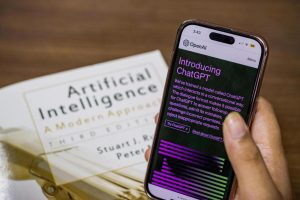In today’s academic landscape, students have access to a plethora of technological tools that can greatly enrich their educational experience. One such tool that has gained immense popularity among students is ChatGPT, a chatbot designed to provide assistance with various aspects of academic writing.
Since its introduction late last year, ChatGPT has rapidly gained global recognition. Developed by OpenAI, this artificial intelligence bot boasts impressive capabilities, offering students the ability to compose human-like essays on a wide range of topics.
Many students have turned to ChatGPT for support with their university assignments. However, a pertinent question looms: Can colleges identify the use of ChatGPT in students’ academic work?
The concise answer to this question is a resounding “yes.” Colleges and universities do have the means to detect if a student has employed ChatGPT for academic purposes, such as essay composition. In this discussion, you will delve deeper into the technology underpinning ChatGPT and explore its potential implications for college students.
Detecting ChatGPT-Generated Essays
As technology continually evolves, an increasing number of students are harnessing the capabilities of AI bots to assist them with their academic assignments. With the assistance of AI bots like ChatGPT, students can craft well-researched and coherent essays by providing just a few basic instructions.
While the advantages of utilizing AI bots for academic tasks are evident, there are important drawbacks that warrant consideration. Some of these disadvantages include:
Inaccurate and Biased Information
One significant concern associated with using ChatGPT as a writing assistant is the potential for inaccurate and biased information. While the AI is engineered to generate essays based on provided instructions, it may not fully grasp the intricacies of the subject matter or the specific requirements of the assignment.
The produced content might contain errors or be irrelevant, which can lead to lower grades from professors. Additionally, ChatGPT has the potential to generate biased content that deviates from the intended topic, a discrepancy that colleges can readily detect.
Plagiarized Content
The use of AI bots for essay creation raises concerns about plagiarism. Although these bots can produce original content, they are not infallible in detecting all forms of plagiarism.
This poses a significant challenge for students who are required to submit authentic work. Colleges and universities maintain stringent anti-plagiarism policies and employ sophisticated tools to identify plagiarized content.
Therefore, students using AI bots for essay composition risk being caught and penalized for submitting plagiarized work. It is vital for students to recognize the potential risks tied to AI bot usage and take measures to avoid plagiarism.
Lack of Originality
A growing number of students have faced criticism for their perceived lack of originality in their academic assignments. This tendency is often attributed to an over-reliance on ChatGPT technology, which has seen increasing adoption.
While ChatGPT technology offers convenience, it simultaneously hinders the development of critical thinking skills and creativity. Students who rely exclusively on AI bots for essay creation fail to engage meaningfully with the subject matter, missing opportunities to nurture their unique ideas and arguments.
Using ChatGPT technology for academic assignments is considered unethical, carrying negative repercussions for students’ academic pursuits. Colleges perceive the use of ChatGPT as a form of cheating, underlining the importance of students utilizing their critical thinking skills and creativity for their academic tasks rather than relying solely on ChatGPT.
To counter the potential adverse effects of ChatGPT and safeguard the integrity of educational institutions, colleges have taken proactive measures to detect the use of AI-generated content. They have adopted cutting-edge technologies that scrutinize language and text structure to identify indicators of machine-generated content.
How Colleges Detect ChatGPT Essays
So, how do colleges detect essays generated with the assistance of ChatGPT? The utilization of AI technology in colleges for identifying fraudulent essays is becoming increasingly prevalent. This endeavor to safeguard academic integrity involves a variety of technologies, including:
Plagiarism Detection Software
Over time, plagiarism detection software has seen significant advancements, primarily driven by developments in AI technology. These software applications no longer merely identify exact matches between content but can also identify paraphrased material and the usage of synonyms.
This enhanced capability makes them far more effective at recognizing instances of plagiarism. Such software is essential for upholding academic integrity and ensuring due credit for original work. It is expected that these programs will continue to evolve and offer even more robust tools for detecting plagiarism.
Machine Learning Algorithms
Machine learning algorithms have revolutionized content analysis. These powerful tools swiftly assess patterns in writing and identify irregularities that might indicate the use of AI-generated content.
By scrutinizing an individual’s writing style and detecting patterns suggesting potential cheating, educational institutions efficiently identify fraudulent activities, thereby safeguarding content integrity. Machine learning algorithms provide a reliable and efficient means of analyzing and identifying irregularities in written content.
Specific machine learning tools have been developed to counter the use of ChatGPT by students. Notable examples include:
Turnitin
This tool employs machine learning algorithms to detect plagiarism and other forms of academic dishonesty. Turnitin compares submitted papers against an extensive archive of sources, identifying any instances of unauthorized copying or paraphrasing.
If an essay contains text generated by ChatGPT, Turnitin can identify and highlight the copied text for instructors to review. This ability is rooted in the vast amount of data used to train ChatGPT, which includes materials added to Turnitin’s records.
GPT-3 Detector
This advanced technology is specifically designed to identify essays generated by ChatGPT-3. It analyzes various aspects of the essay, including writing style, coherence, and logical flow.
Essays that fail to meet the detector’s standards are flagged as potentially fraudulent. This technology has proven to be highly effective in detecting ChatGPT-3 generated essays, aiding colleges in upholding academic integrity.
Authorship Attribution
Authorship attribution software employs advanced algorithms to compare the writing style of an essay to that of the student’s previous work. This analysis allows educators to determine originality with a high degree of accuracy.
If the software detects a significant deviation in the writing style of the submitted essay compared to the student’s previous work, it may suggest that the essay was not authored by the student. This feature is invaluable in preventing cases of plagiarism, as it helps identify instances where someone else may have composed the essay.
While ChatGPT essays may appear to offer an easy route to academic success, colleges are fully cognizant of this new form of academic dishonesty and have implemented a range of measures to detect it. Plagiarism detection software and AI technology are just two of the strategies employed to unearth fraudulent essays. Students should weigh the risks of detection and the potential consequences before attempting to utilize ChatGPT for academic deception.
Penalties for Being Caught Using ChatGPT in College
The prospect of colleges detecting ChatGPT usage in college coursework raises important questions about the consequences students may face. Using ChatGPT to complete assignments in college can lead to severe academic penalties and disciplinary actions.
The severity of these punishments can vary based on the nature and extent of the violation, as well as the college’s specific policies on academic integrity. It is imperative to comprehend that academic dishonesty can have lasting effects on one’s academic and professional future. Some of the penalties for being caught using ChatGPT in college include:
Failed Assignment
When a student is discovered using ChatGPT technology to complete an assignment or essay, the most immediate consequence is the potential receipt of a failing grade for the work in question. Such a grade can significantly impact the student’s overall course grade, potentially lowering their GPA and making it more challenging to succeed in future classes.
Academic Probation
Academic probation represents a serious consequence that colleges may impose on students found using ChatGPT in their assignments and coursework. In certain cases, students may face suspension from the course, program, or even the college itself.
However, if a student is placed on academic probation, they are granted a limited number of opportunities to rectify their behavior and improve their academic standing. During this period, students must demonstrate a renewed commitment to their studies and address any underlying issues that contributed to their academic struggles.
Expulsion
Expulsion constitutes the ultimate consequence of academic dishonesty, and colleges treat it with utmost seriousness. Students who utilize ChatGPT for cheating or plagiarism jeopardize not only their academic integrity but also their entire future. Being expelled from the institution could necessitate starting the academic journey anew, which can be challenging and time-consuming.
Damage to Reputation
The repercussions of academic dishonesty extend beyond the immediate academic consequences. Such misconduct can lead to a damaged reputation, casting the student as dishonest and untrustworthy.
This harm to one’s reputation can have far-reaching and lasting implications for future educational and career opportunities. Repairing a damaged reputation is challenging and requires taking responsibility for one’s actions to protect future prospects both within and outside academia.
Academic integrity constitutes a vital aspect of the academic community, and its significance cannot be overstated. Violating academic integrity has profound consequences. It is imperative for students to exercise caution when using online resources like ChatGPT.
While ChatGPT serves as a valuable tool in the research and essay-writing process, it should never substitute original thought and effort. Students should employ ChatGPT as a supplementary aid to enhance their own ideas and research, rather than relying solely on it as the primary source of information.
Seeking Professional Assistance with Your Essays
Amidst concerns about the detectability of ChatGPT usage in college assignments, it’s important to note that professional assistance from human writers far surpasses the capabilities of AI-driven chatbots. Professional writers offer superior quality and support, ensuring that students receive guidance tailored to their specific needs.
The advantages of enlisting the help of professional writing services include gaining a deeper understanding of assigned topics and subjects, which can lead to better results in academic endeavors. Trust services from Experts such as My Homework Empire to give you original high quality work that will leave a lasting impression on your lecturers and peers alike.
FAQs
Will I get caught using ChatGPT?
Yes, colleges and universities are becoming increasingly adept at identifying academic dishonesty. Plagiarism detection tools are continually advancing and can readily detect AI-generated content.
Can professors detect ChatGPT code?
Yes, professors can detect the ChatGPT code used to generate essays. Using machine learning tools like Turnitin, professors can analyze ChatGPT-generated content.
Does ChatGPT provide identical answers each time?
No, ChatGPT does not furnish identical responses every time. It is known for paraphrasing and employing synonyms, generating responses based on information available on the internet.
Can Turnitin detect ChatGPT?
Yes, Turnitin and similar plagiarism detection software can identify text generated by ChatGPT or other AI-powered tools. Turnitin compares submitted texts to a vast database of published works and other sources, allowing it to pinpoint instances of plagiarism.






